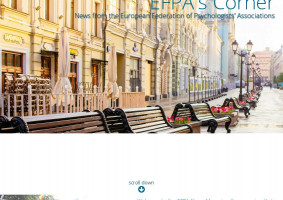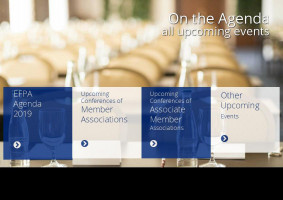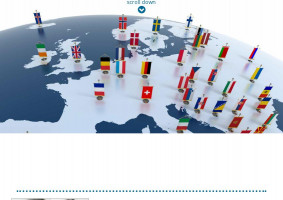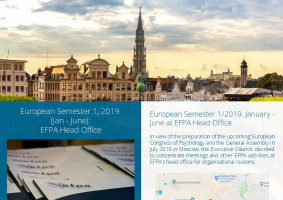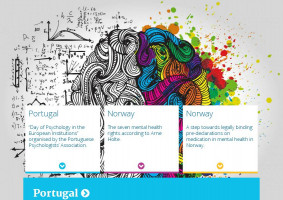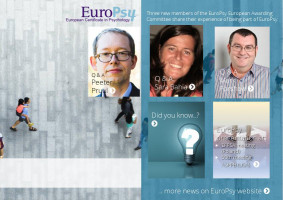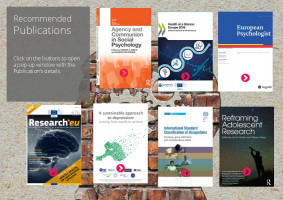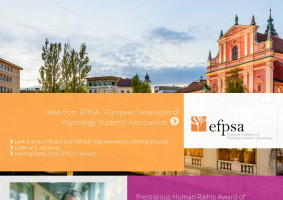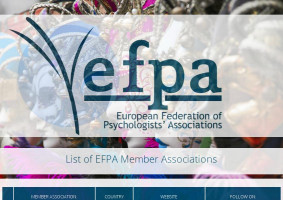Welcome to the EFPA News Magazine, the magazine that was established for the exchange of all relevant news and information among our member associations.
We hope the New Year has started well for everyone!
In this edition of the EFPA News Magazine, we present an update of news and current activities of our EFPA boards: The Board of Human Rights and Psychology, the Board Promotion and Prevention and the Board of Educational Affairs. You can find the highlights here below.
Of course, there is news from EuroPsy: in a Q & A, three new members of the EuroPsy European Awarding Committee will share their experience of being part of EuroPsy. Furthermore, one specific research project is highlighted: a research project on Parenting for a Digital Future.
And, besides the usual selection of recommended publications, the agenda of upcoming meetings and events and miscellaneous news of member associations, we introduce a list of interesting blogs to follow and newsletters to subscribe to!
Do you have news worth sharing with our member psychologists’ organizations in Europe and beyond? We’d be pleased to receive your announcements.
Enjoy the February edition of the EFPA News Magazine!
The editorial board.
news@efpa.eu
Follow us on


EFPA Board Human Rights & Psychology presents:
Newsletter
Human Rights & Psychology
The EFPA Board Human Rights and Psychology provides a newsletter dedicated to this specific field of interests. The first newsletter in 2019 of the EFPA Board Human Rights and Psychology, starts with an Erasmus exchange between the universities of Pula, Croatia and the Bahamas. Read the interesting articles about migrants in the Mediterranean and the position of students in Turkey.
Every month a newsletter will be released.
_w766_h398_1.jpg)
_w804_h276_1.jpg)
The book will comprise chapters by more than 30 authors from all over the world, divided over 5 parts:
- A human rights based-and-oriented psychology
- Challenges to human rights realisation
- Human rights and professional ethics
- Human rights and professional practice
- Human rights education for psychologists.
The host of the meeting was Polli Hagenaars in Amsterdam and the meeting gathered all the editorial board members: Nora Sveaass (Norway), Ulrich Wagner (Germany), Tony Wainwright (UK) and Marlena Plavšić (Croatia). The publisher is Routledge, and the book is intended to be released next year.
The ‘Human Rights Education for Psychologists’ textbook is a follow-up of the expert meeting the EFPA Board Human Rights & Psychology had in Venice in October 2016 , organized by EFPA, EIUC and FRA.
EFPA Board Promotion and Prevention:
Prevention of depression, why we need to think big
By Jennifer Klop-Richards, member of EFPA Board Promotion and Prevention
In their letter to the editor in World Psychiatry, Johan Ormel, Pim Cuijpers, Anthony F. Jorm and Robert Schoevers (2019) discuss next steps for taking the prevention of depression to a higher level. Specifically, they make a strong case for targeting strong determinants early on, such as poor parenting, low self-control, negativity, and poor life skills. They call on politicians to think big by structurally embedding prevention strategies in society, thereby making prevention the norm. We hope their message is heard.
You can read the letter here: Prevention of depression will only succeed when it is structurally embedded and targets big determinants.
Survey:
A survey on pre-university psychology education in EFPA member countries’ schools
The EFPA Board of Educational Affairs and the European Federation of Psychology Teachers' Associations (EFPTA) jointly carried out an online survey of EFPA member associations (MAs) in early 2017.
The aim of the survey was to discover the extent of pre-tertiary psychology education (PTPE) in European countries. EFPA invited its 37 MAs to respond to a questionnaire. One response per MA was requested, and 28 responses were received from 20 EFPA member countries, a response rate of 56%. Participants were asked about various aspects of availability of psychology as a school subject in their country, and about the extent of the MAs’ involvement in the provision of psychology as a school subject. Questionnaire responses were subjected to quantitative analysis in the form of descriptive statistics and some free text responses were also recorded.
Our findings show that in Europe, PTPE teachers and students make very diverse journeys into the discipline of psychology. >>

>> However, qualitative responses suggest that there is substantial cross-border consensus amongst teachers about the value of the subject in the high school curriculum, and high demand from students.
However there is great variation in the psychology community, amongst psychologists, psychology academics and researchers, in their attitudes to, and level of involvement in PTPE, especially in relation to curriculum and teacher education. So it appears that pre-tertiary psychology teachers and students are not always well nurtured along their journey into the discipline.
Download the survey report from EFPA website



